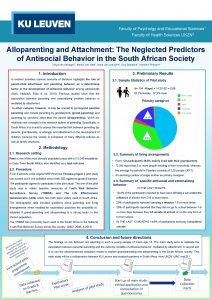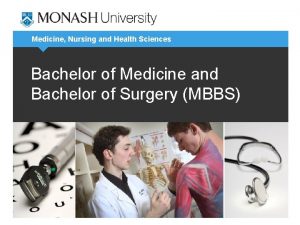Faculty of Psycholgy and Educational Sciences Faculty of

- Slides: 1

Faculty of Psycholgy and Educational Sciences Faculty of Health Sciences UKZN 1 2 Alloparenting and Attachment: The Neglected Predictors of Antisocial Behavior in the South African Society Tanya van Aswegen 1, Martijn Van Heel 1, Karla Van Leeuwen 1, Guy Bosmans 1, Hamilton Pharaoh 2 3. Preliminary Results 1. Introduction In western societies copious amounts of literature highlights the role of 3. 1. Sample Statistics of Pilot study parent-child attachment and parenting behavior as a determining factor in the development of antisocial behavior among adolescents N= 104 M(age) = 14. 20 SD = 0. 88 (Gaik, Abdullah, Elias & Uli, 2010). Previous studies show that the 62. 7% female 37. 3% male Mother & Father association between parenting and externalizing problem behavior is Primary caregiver mediated by attachment. Mother Father In other cultures, however, it may be crucial to go beyond parental Grandparents parenting and include parenting by grandparents (grand-parenting) and Other Guardian 16, 5% parenting by someone other than the parent (alloparenting), which are relatively new concepts in the research sphere of parenting. Specifically, in South Africa, it is crucial to assess the important link between parenting (by parents, grandparents, or siblings) and attachment on the development of children, because the society is comprised of many different cultures as 35, 9% well as family structures. 0 3. 2. Summary of living arrangements 2. Methodology 2. 1. Research setting Paarl is one of the most densely populated areas with ± 112. 045 inhabitants in Cape Town South Africa, also identified as a high risk area. 2. 2. Procedure • From 104 participants, 16, 5% mainly lived with their grandparents. • 72, 3% report that 5 or more people residing in their household, whereas the average household in Flanders consists of 2, 32 people (2017). From 5 schools in the original NRF Post Doc Thutuka project a pilot study was carried out in one selected school with 250 registered grade 8 learners. 104 participants agreed to participate in the pilot study. The aim of the pilot • An alarming number of single mother as primary caregiver. 3. 3. Summary of specific antisocial and externalizing behavior IN THE LAST 30 DAYS study was to obtain baseline measures of Youth Risk Behavior Surveillance Survey (YRBSS) and The Life Effectiveness Questionnaire (LEQ) which has both been widely used in South Africa. • 19, 4% of the participants reported to have been driving a car under the influence of alcohol from 2 -6 or more times. The demographic data included questions about parenting and living • 29% of participants reported carrying a weapon 1 -6 or more times. arrangements which enabled for exploratory purposes the possibility to • 29% of participants reported that they did not go to school between 1 -6 establish if grand-parenting and alloparenting is a strong factor in this or more days because they felt unsafe at school or on the way from or chosen population. to from school. The YRBSS has previously been used in the South Africa in the National Youth Risk Behavior Survey across the country. (2002, 2008, & 2013) , t c je o r P to c a o 16 f D o st n 20 act o P di p uth F m i R e n N tart the e yo i s ine nsiv gram m ehe pro r e det ompr ment frica c lop th A e u v o e S d t o l i p l o e o h c m S m t d a s r r e i g c F o n pr me m o c d e t c e l l o c a t 8 Da e d a r G on s r e n lear • IN THE LAST 12 MONTHS 14, 6% of participants seriously considered suicide 4. Conclusion and future directions Timeline The findings on risk behavior are alarming in such a young sample of mean age 14. The main study aims to replicate the association between parental parenting and the outcome variable of antisocial behavior, mediated by attachment. A second aim is to use the aforementioned mediation model to explore grand-parenting and alloparenting in the South African society. This main study will be a collaboration between KU Leuven and research partners in South Africa from UKZN, UWC and SU. 2018 2017 y r o t a r o l Exp tudy s t o l Pi An y d u t s t o l i p f o s e s y al Start up of main studyethical application and compellation of questionnaires 2019 Data Collection starts

